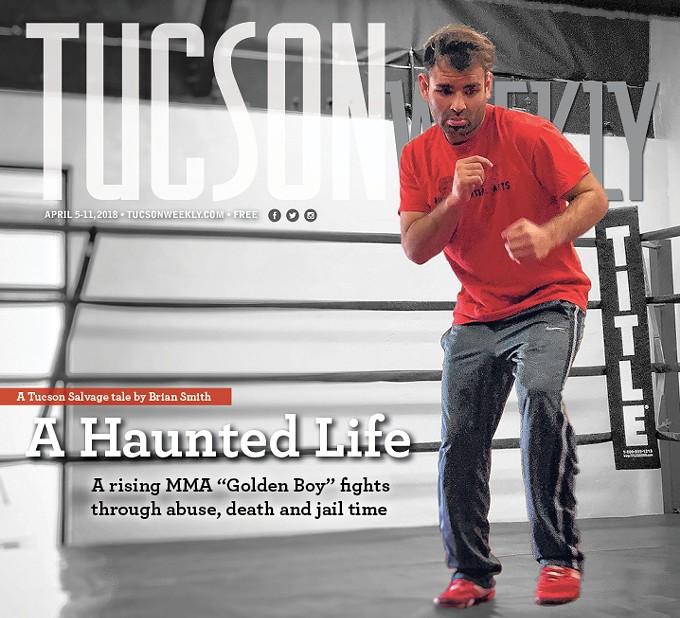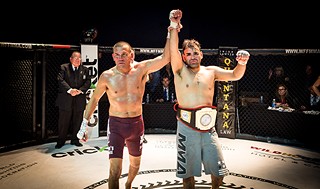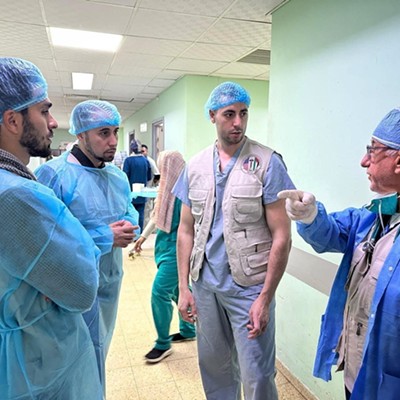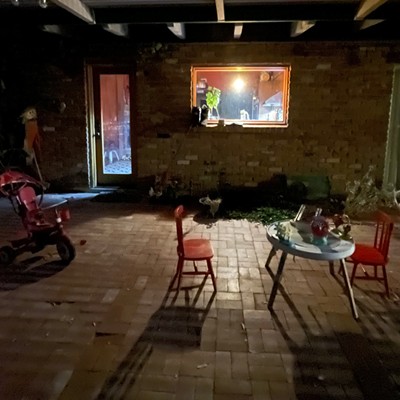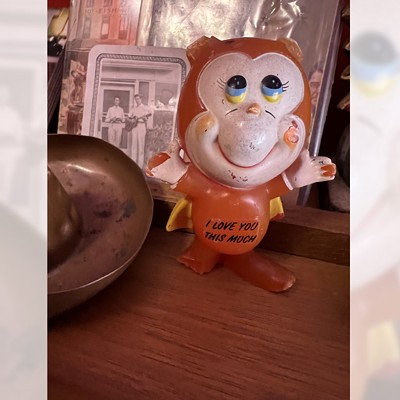The two boys, about five years apart, had lots in common. Their mother, Mercedes Perez, adored and cherished them. And she worked hard, mostly long days at the Tucson Mall, and had moved to the small town of Catalina outside Tucson to get a fresh start away from the town's southside drugs and gangs, and family squabbles. Her onetime partner, the father to her eldest son Andrew Perez, was a too-tough, womanizing pro boxer who'd been sent to jail, serving a 20-year stint for dealing mad amounts of drugs (he's out June '18). One of her sisters, Patricia Perez, was murdered by her own husband in front of their 10-year-old son.
Young Andrew had always felt like he was living two lives, his American side, out in Catalina, and his Mexican side, on the south side with his many cousins, and nine other half-brothers and sisters (on his dad's side). Though he has learning difficulties, he never stopped speaking Spanish at Grandma's house, across the street from the Tucson Rodeo Grounds. But Andrew was glad to live outside of town, in a tiny neighborhood area folks call "Little Mexico," which sits inside a white enclave.
He immersed himself into the new culture. Hearing stories about his dad being a fighter, he became a huge fan of WWF wrestling, which, at a tender age, he thought was real. He gravitated to wrestling young and, in his teens, mixed martial arts. (Diego Sanchez was his teen-years idol.) At school wrestling matches, he was "envious of the kids whose dads got to watch them." That's what he wanted. He grew up going to church, mostly Catholic. Communion, confirmation. In some of his high school years, he was a group leader in church, and a counselor at the YMCA.
Andrew and his little brother, Adrian, were molested too, by a female babysitter. She'd force them to touch each other and touch her. When Andrew talks of it now, it's obvious whatever bitter traumas in the recesses of his character had been buried under agonizing shame, because no way was he ever going to tell anyone what happened. Andrew's cousins, whom he looked up to, preached "toughness," and to be a man.
By 2004, 15-year-old Andrew was a special ed student with a slight stutter, and good high-school wrestler. He still had severe difficulty reading and writing—and he'd have trouble in class. He'd find himself ineligible to wrestle when he couldn't get his grades up. But like any sport, motivation to wrestle is often a reaction against something else entirely. And he rarely had much confidence in himself. Says he "started hanging out with the wrong crowd."Then the first accident happened.
Mom had been teaching him to drive, a stick, and he was getting good at it. One day, she allowed him to take the car one mile to the Burger King on Oracle Road. As he pulled from the house his brother was goofing around and hopped on the hood. Then he slipped off and the car rolled on top of him.
"I just remember him getting up and falling into my arms," Andrew says. "He was just screaming for my mom."
The dark, hushed interior of that same Catalina house where the accident happened is a home his mom worked hard to make livable and cozy. Framed photos on walls, stuffed leather couch, flatscreen, Easter-colored flowers atop corner book shelves populated with little antique clocks and tea-light candles, angels and Japanese figurines. Andrew is seated at the kitchen table. He's old-school good-looking—bushy eyebrows, forever 5 o'clock shadow, resembles a young Robert Blake, In Cold Blood-era. A self-designed tat ornaments his upper chest, a rosary and the words "Stay Strong." We can hear Andrew's girlfriend and daughter in the back bedroom, watching TV and laughing.
Andrew continues.
"When I saw him—Adrian Daniel Perez, that was his name—in the hospital, he was bloated and swollen."
Andrew begins crying softly. "I went to him and said 'Adrian, it was an accident, I didn't mean to do this. Please. I need a sign that you know this was an accident. And he moved his hand. And then he moved his foot. And I said, 'don't joke with me, please do it again.' And he did."
A few days later, doctors pulled Adrian off life support and little bro was gone.
"I just remember knowing I was going to be OK— because my brother knows it was just an accident. Though everyone knew I killed my brother. I had to live with that too. Sometimes I'd say to myself, 'I did it. I killed my brother.'"
When he did, he'd act out, get violent, post-traumatic stress. He'd punch walls, doors. His mom didn't repair the holes to remind Andrew of the wreckage he was leaving behind. The holes are still there today.
"Sometimes, my mom would get a little drunk and blame me," Andrew says. "I expected that. But how is a 15-year-old who just ran over his brother supposed to control something? I know how emotions go, and I understand that now. But I still sometimes blame myself for things to this day."
Time moved on. Andrew attended counseling sessions, mostly through church and what his mother could afford. His mom trusted Andrew again too—the anger issues— though he kept "things bottled up." The shame spiral slowed. Mom promised she'd do anything for him if he stayed free of smoke, drugs and alcohol until he was 21.
He promised and steered clear. He was her angel, Mom told him. Her new man helped too.
"So the best thing was when my stepdad came into my life. He was younger than my mom, maybe 25. Not that much older than me then. He was changing me, and I didn't even know it. He moved in and had me change my work ethics. You know, 'If you want something, you've gotta work for it.' So, I'm actually passing my classes and doing my homework. My junior year, he never missed a wrestling match. He got me to graduate high school. He's still my dad.
"But there's times when I exploded with my mom," Andrew adds. His solicitude could almost be the cower of a defeated person. "Because I didn't know how to control my anger."
At 19, he dove headlong into mixed martial arts (MMA), and worked at it, hard. He made his amateur debut in 2009, a cage fight at Tucson Convention Center. Around 35 people showed up just to see him—cousins, brothers, sisters, stepdad, mother. Andrew won. Then he aced his next seven fights. He won eight straight as an amateur.
"All these stories I heard of my dad being a fighter," he says. "And I was like 'I could actually do this.'"
Some fights were better than others. "I remember fighting in Globe, Arizona, in back of a Fry's grocery store. A parking lot where they set up the cage ... where maybe 400 people showed up."
Like any hard-won career, in the arts, in sports—or anything in this world—to be truly great, everything else in life suffers. It's how one transcends the conventional, the ordinary, the tragic.
"I got a lot of support from my family and others," he adds. "My cousins knew I was going to be something. And I've grinded. I've done so many sacrifices."
Andrew talks a lot of how he pulls strength from those who've been father figures or family figures: his neighbors, his grandma (who died in November), one particular neighborhood family who brought him to and from school and practices. His coach. It reminds me of passages from a new, go-to PTSD tome called The Body Keeps the Score in which Dr. Bessel Van Dee Kolk writes how he'd become a lifeline for patients. The father they'd never had, and how "deep down many traumatized people are even more haunted by the shame they feel about what they themselves did or did not do under the circumstances. They despise themselves."
Mixed martial arts (MMA) is a brutal, full-contact hybrid of martial arts, wrestling and boxing. It's punk-rock fast and prize-fight grueling, and at first resembles street brawling, except that it's heavily refereed, ruled and coached.
Good fighters are serious, well-trained athletes, no joke. Hints of masculine grace transcend cage-fight viciousness and unintentional homoeroticism. Basically, two fighters duke it out inside a chain-linked, octagon-shaped cage while employing (enduring) three basic tactics—striking, grappling, and controlling. Submission, a knockout or a referee decides match winners in many bouts.
MMA's popularity has risen drastically since it's '93 inception. A 2016 Washington Post sports poll said 25 percent of Americans count themselves fans of mixed martial arts, a percentage that rivals boxing. MMA's premier organization is the Ultimate Fighting Championship (UFC), and any local fighter worth his or her salt is keen on it. But you have to be good, and storied.
Today we're at Tucson's Apex Mixed Martial Arts gym in Northwest Tucson. This state-of-the art facility is hardly Rocky's Mighty Mick's Gym; it's upscale, airy, well-lit. Even smells clean. There's a boxing ring, an octagon-shaped ring wrapped in chainlink, a sprawling floor mat, workout machines. MMA championship belts hang near the entrance.
A trio of MMA fighters, Andrew, Joel Champion (his real name) and Jeff Anderson, are in the boxing ring completing the first phase of before-noon weekday training. Down-dressed in sweatpants and tees, the sweat-sheened bros bounce and punch like pantomimes trapped inside bubbles. Kanye and Keith Urban pump the in-house stereo.
During a break, Andrew says of his training partners, "These guys are my brothers, my Ninja Turtles."
Andrew is mastering MMA's multiple skill sets with aplomb. He's been christened "Golden Boy" since turning pro in 2011, mainly because it's being said that nothing can stop him—no death, no drug addiction and, now, no opponent. It's telling how his body looks almost humble compared to other fighters; it's not overly gym-sculpted, and it radiates a humanness that's doesn't seem at all mean-spirited—but in action it's absolute force.
As his coach says, "Andy's savage, but he's all heart. There's something there that you can't see."
Andrew's only professional losses came (he's chalked up four total, against seven wins) when he was, his coach points out, "self-defeating."
His coach, New Jersey-born Joey "Boom Boom" Rivera, is a chiseled, semi-retired fighter and owner (and much-decorated black belt champion) of the Apex gym, where Andrew trains nearly every day. He's got piercing blue eyes, thick pony-tailed hair and a firm command of platitudes ("Everybody, in some way, is a fighter. That's what I believe"). He's a father and husband whose long-winning track record and low body fat go lengths to explain his confidence. His fighters all listen to his commands with the high-stakes focus of war planners in a military room. In MMA worlds, Rivera's a badass.
In 2009, Rivera took the troubled fighter under his wing, his heady work ethic a rebuke to Andrew's inner traumas.
Andrew, who turned pro in 2011, says he'd be nowhere without Rivera. Rivera says "Andrew made his career. I only helped with some decisions." Either way, Rivera is big-bro/father figure to Andrew. He doesn't suffer horseshit, from Andrew or any of his fighters. Andrew's always been straight-up with Rivera.
"He comes from a bad place; it just happens that he was a right student," Rivera says. "And when he got here he was an absolute savage, undefeated as an amateur."
Good MMA fighters like Andrew work grueling hours in daily training sessions, pay physical and emotional dues and damages. And they hustle. MMA fighters gleaned much from the hip-hop school of self-promotion; like street rappers, fighters brand and merchandise themselves gratuitously, obtain sponsors. It's how they survive. Andrew's living relies on sponsors, mostly private ones—families, friends and local business owners—and also his winnings. He has no other job, though most fighters at his level do. If he gets hurt, he's screwed.
But his overhead's low. He rides the bus from Catalina everywhere because he can't drive. (Part of his training includes a run to the bus stop.) He fights in the Arizona-based World Fighting Foundation (WFF). The theater-sized regional fights are well-attended, now mostly held at casinos.
Andrew's winnings alone aren't enough to live on, even for a guy who holds the WFF pro championship belt in the lightweight class. (He defended the title in February this year, against an older fighter, Thom Ortiz, who actually knew his biological father.) Andrew won't reveal how much coin he's pulling down but acknowledges the risk/reward ratio is low. He fights three or four times a year, the most any human can absorb.
The thing is, Andrew is closer to getting into the vaunted UFC. Even if he does, the median salary for a UFC fighter rivals the median salary for a U.S. worker, about $44,000 a year. Not exactly retire-for-life dough.
Though Andrew has left his coach Rivera a couple times, the coach says Andrew has always had a home at Apex. "Look," he says, "we all need to feel wanted. We're all the same. So there was never a time when I turned my back on him." He pauses. "The hardest part of the fight is with ourselves."
At 22 years old, Andrew was believing his own hype, thinking he "was better than I actually was." So he stopped training and developed a taste for opiates, Percocet specifically. And their magic in erasing excruciating memories, "those images of my brother."
Soon enough he couldn't control it.
Exactly five years ago, Andrew hopped in his Ford pickup to go "score another pill" and headed south down two-lane rural North Twin Lakes Drive. It was nighttime, an unlighted road, pitch dark. Says he saw a coyote or dog in the road, swerved, hit a pot hole, lost control, went into "a fence or a tree."
But news reports said Andrew had crossed lanes onto the opposite dirt shoulder where a "victim was struck ... then ran into some smaller trees and brush before returning back onto the roadway."
Andrew swears he didn't know he hit anybody. His mom, family and court agreed. He got charged with leaving the scene of an accident involving death. The fighter got probation. The parents of Jacob Lee Wyckoff started a Facebook page called Parents Against Vehicular Homicide.
"When I came home, the only thing I was thinking was my mom was going to whoop my ass because I messed up the truck," Andrew says. "I remember getting a call from my dealer, 'Hey, they got the road blocked off where you crashed.'"
Andrew returned to the scene and turned himself in before he "knew there was a body there. His name was Jacob. He was 22. I'm still sorry. And I know people are gonna read this and be like 'Aw, he deserves much more.' Some made it seem like I did my brother on purpose too. You know a lot of them say 'this is his second death. He's ran over two people.' But I'm telling you right now it was an accident. I never met the kid. If anything, maybe I saw him once because it's a small town. But that's it."
Did he ever speak to Jacob's parents? "No," he says, pricks of sadness returning to his eyes. "Jacob's parents hate me. Of course. I don't blame them. I'd hate me too."
Andrew and his family are still recovering from the debt; the lawyer alone demanded a $40,000 retainer.
"The lawyer is who got me this plea," Andrew says, "and I remember when I violated parole even the judge was telling me, 'Your lawyer did amazing work.' He wasn't even happy with the plea I got."
Andrew didn't want to live after the accident, and the opiates got him. He dropped dirty urine, violated probation and went straight to the big house. Did a year and a half at Florence and Yuma state prisons.
When he got out, he was ready to fight. That's when he won the WFF championship in '16.
Because of the fighting, local kids look up to him. He's a hammer-knuckled cautionary tale who's not hiding anything, who acknowledges his story, and current sobriety.
"When I was doing the drugs, I didn't know how many people looked up to me, and I let them down," he says. "I knew I was gonna overcome it. And now I feel better than ever."
Before Andrew's fighting career ends, coach Rivera's "100 percent convinced" Andrew will open and operate an MMA gym and coach a corps of young fighters. It's Andrew's dream too. "To open a gym in Catalina, or maybe Mexico, where it could help kids."
Then he stops. He's got the felony rap on his record, and Jacob haunting him.
After a long pause, he adds, his voice softer this time, "In the beginning, I would just wish more that Jacob's mom knew it was an accident. I didn't do it maliciously. I didn't know him. Because she did lose her son. I know how it is."

